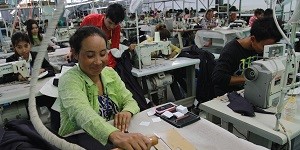
For developing countries in particular, initiatives to promote new investments in industry can complement COVID-19 recovery efforts and produce structural changes.
Global investment can be a driving force for a more inclusive and sustainable future post-COVID-19, particularly if funds are directed to where they are most needed.
That was the main message from the Global Leaders’ Investment Summit at UNCTAD’s 7th World Investment Forum on 19 October, gathering heads of international organizations, government officials and thought leaders in business and academia.
They set out strategies to get the world’s investment priorities right, including reversing a decline in foreign direct investment (FDI) in developing countries during the COVID-19 pandemic.
World leaders and government ministers from Egypt, Indonesia, Jordan, Morocco and Pakistan shared national examples of investing in pandemic relief, conserving the environment, reducing carbon emissions and upskilling their workforce.
Beyond infrastructure into industry
While opening the summit, UNCTAD Secretary-General Rebeca Grynspan spotlighted three megatrends impacting global value chains.
She pointed to ongoing technological advances; rising interventionism and protectionism associated with mounting geopolitical tensions; and the need for a green transition to sustainably rebuild economies.
“Great transformation requires great investments. And great investments require a growth perspective,” Ms. Grynspan said, calling for investment development paradigm changes as the world strategizes ways out of the public health crisis.
While many countries made “sound investments” in infrastructure as part of their COVID-19 recovery efforts, Ms. Grynspan said it’s important to “see beyond infrastructure into industry.”
She flagged that shipping costs are now five times higher than pre-pandemic levels and emphasized the need to shore up investment into the hardest-hit manufacturing and service sectors, cautioning that failure to do so could put a brake on productive capacity growth.
“For developing countries in particular, initiatives to promote new investments in industry will be important to complement recovery efforts and produce structural changes,” Ms. Grynspan added.
Worrying phenomena
Despite signs of recovery in global investment, there is uneven growth in an unequal world, several speakers warned.
Professor Jeffrey Sachs, a world-renowned economist and advocate for the UN Sustainable Development Goals, urged “real development financing” that gets funding to poor countries struggling to meet basic budgetary needs.
“How are you going to do business development if the kids have no skills, if the graduation rate of upper-secondary level is 25% in most of sub-Saharan Africa?” Professor Sachs posed.
Børge Brende, president of the World Economic Forum, echoed the concern: “Really, there will be no recovery without investment recovery, including in emerging markets and developing countries.”
In contrast, Mr. Brende cited a $3.6 trillion investment boost resulting from global mergers and acquisitions in the first half of 2021, surpassing the total of all deals made in 2020.
He said: “Trillions of dollars of capital have been looking for productive investments. What is worrying though, is that this capital is not flowing where it’s needed most.”
Invest where needs are greatest
The summit heard recommendations on key investment areas for economic growth and sustainability.
These include investment to bolster health-care infrastructure, health science and innovation; information and communications technology to bridge the digital divide; and the renewable energy transition to a circular economy.
“We do believe that technology will be fundamental. We’re going to need investments and cooperation to make sure that we continue to progress,” said Roberto Marques, who leads Natura, a Brazilian company working in fair trade with more than 7,000 indigenous people in the Amazon region.
“We have an opportunity to be more intentional about it, in terms of how we funnel resources, in which areas we’re going to create incentives.”
Improve investment climate
Peter Robinson, who heads the United States Council for International Business, highlighted the urgency to build an enabling environment for FDI, a major catalyst to development.
Mr. Robinson referenced findings of the Organisation for Economic Co-operation and Development (OECD) indicating that global FDI flows decreased by 38% in 2020, to the lowest levels since 2005.
“While the solution to pandemic recovery is multi-faceted, FDI is a key component,” Mr. Robinson said. He called for the strengthening of a rules-based trade and investment system to safeguard investors’ rights, particularly when investing in riskier markets.
The World Investment Forum held from 18 to 22 October is the largest global platform for investment and development. It was established in 2008 and over the past decade has made a significant contribution to investment-for-development policymaking.